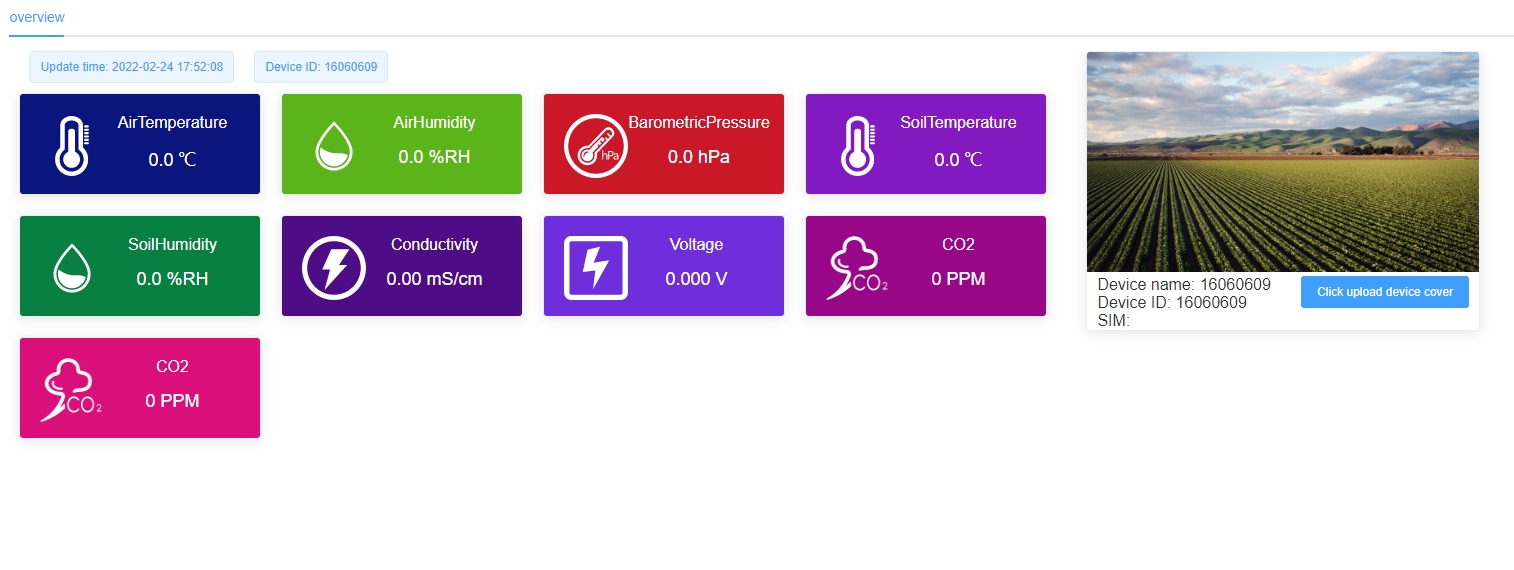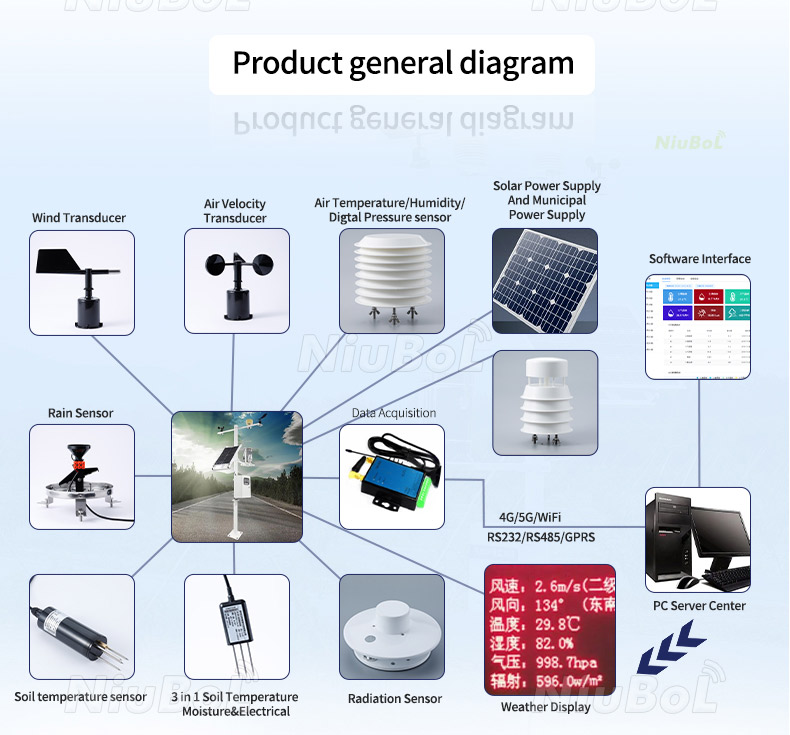

— Blogs —
—Products—
 Consumer hotline +8618073152920
Consumer hotline +8618073152920 WhatsApp:+8615367865107
Address:Room 102, District D, Houhu Industrial Park, Yuelu District, Changsha City, Hunan Province, China
Product knowledge
Time:2024-09-04 15:20:20 Popularity:1200
This paper introduces the Multi-function Weather Station Instrument as an innovative solution for modern weather monitoring. The instrument integrates a high-precision data collector and a variety of meteorological element sensors, and is capable of real-time monitoring and recording key meteorological parameters, such as ambient temperature, humidity, wind speed, wind direction, barometric pressure, soil temperature, soil humidity, and so on. Through advanced data transmission technology (e.g. 3G/4G/5G/6G network), the instrument uploads the collected data to the cloud platform server in real time, and supports remote viewing by PC and cell phone APP.
In addition, the instrument is equipped with a variety of power supply options (utility, solar, battery, etc.) to ensure continuous and stable operation in various environments. This paper introduces the significant advantages of multifunctional weather station instruments in improving the accuracy of meteorological monitoring, realizing remote management and reducing operation and maintenance costs, providing powerful data support for agriculture, forestry, meteorology, environmental protection and other fields.
The weather station instrument is a highly integrated and multi-functional system designed to comprehensively monitor and record various environmental meteorological parameters. Its detailed basic composition, characteristics and applications are as follows:
High-precision data collector: as the core of the whole system, it adopts industrial-grade processing chip and is designed to be lightweight, sturdy and beautiful, able to withstand harsh environments (e.g., high temperature, low temperature, high humidity, sand and dust, etc.) to ensure the accuracy and continuity of data collection. The data collector supports a variety of sensor interfaces, which can collect all kinds of meteorological data in real time and accurately.
Environment category: including temperature, humidity, wind speed, wind direction, barometric pressure and other sensors, used to monitor the basic parameters of the atmospheric environment.
Soil category: sensors for soil temperature, soil humidity, soil pH, soil salinity, etc. for assessing soil conditions and agricultural irrigation needs.
Radiation and Optics: total radiation sensors, light intensity, UV radiation, photosynthetic radiation, etc. for monitoring solar radiation and photosynthesis related parameters.
Others: such as rainfall sensors, carbon dioxide concentration sensors, sunshine hour meters, etc. for monitoring precipitation, air quality and light hours.
Bracket and protective box: Provide a solid mounting base and necessary protection for the sensors and data collectors to prevent the equipment from being damaged by external factors (e.g. wind, rain, snow, animals, etc.).
Solar power supply control system: as an optional power supply method, the system includes solar panels, storage batteries and controllers, which can provide continuous and stable power supply for the weather station in the case of no utility power or unstable utility power.

Data receiving platform: deployed on the cloud server, it is responsible for receiving and storing data from the weather station. The platform provides data query, analysis, report generation and other functions, and supports PC and mobile access.
Mobile Client Software: provides users with convenient mobile access, users can view real-time weather data, historical data charts and alarm information anytime and anywhere through cell phones or tablet PCs.
1. High accuracy and stability: all sensors are carefully selected and calibrated to ensure the accuracy and stability of measurement data.
2. Flexible Configuration: Users can select different sensors according to the actual needs, to build a personalized weather monitoring program.
3. Remote monitoring and management: through the cloud platform and data receiving platform, it realizes remote monitoring and management of the weather station and reduces the operation and maintenance cost.
4. Multi-source power supply guarantee: support utility power, solar energy, storage battery and other power supply modes to ensure that the weather station can work normally under various conditions.
5. High protection level: the design of the equipment takes full account of the requirements of waterproof and dustproof, and the waterproof level reaches IP65, which is suitable for long-term outdoor use.
6. Data security: adopting encryption technology to transmit data, ensuring the security and integrity of data in the transmission process.
7. Easy maintenance: the data collector is designed to be easy to maintain, and the sensor replacement is simple and quick, which reduces the maintenance difficulty and cost.

Weather station instruments are widely used in agriculture, forestry, meteorology, environmental protection, scientific research and other fields, providing important data support for crop growth management, forest fire early warning, weather forecasting, environmental monitoring and scientific research. The following are a few major application areas and their specific applications:
1. Agricultural production
Precision agriculture: Weather station instruments can monitor the environmental parameters of farmland in real time, such as temperature, humidity, soil moisture, light intensity, etc., to help farmers optimize planting plans, irrigation strategies and pest control measures. With accurate weather data, farmers can manage their farmland more scientifically and improve crop yield and quality.
Crop growth monitoring: By monitoring parameters such as carbon dioxide concentration and photosynthetic radiation, weather stations can assess the growth status of crops and provide farmers with timely growth regulation suggestions to promote healthy crop growth.
2. Weather Forecasting and Scientific Research
Weather forecasting: The data collected by weather station instruments are an important basis for weather forecasting. By analyzing these data, the meteorological department can issue more accurate weather forecasts to provide guidance for public travel and agricultural production.
Meteorological research: Weather station instruments play an important role in meteorological scientific research. Researchers can use these data to conduct climate change analysis, climate model validation and other research, providing strong support for the development of meteorological science.
3. Urban planning and management
Extreme weather warning: urban weather stations can monitor and warn extreme weather events in real time, such as heavy rain, snowstorms, high temperature, etc., which provides an important basis for urban flood prevention and drainage, traffic management, public safety and other work.
Environmental protection: By monitoring air quality, radiation intensity and other parameters, the weather station helps to assess the quality of the urban environment and provide data support for environmental protection departments to formulate management measures.
4. Aviation Navigation
Flight safety: aviation weather stations provide real-time weather information for airlines, which helps pilots make safe route planning and take-off and landing decisions to ensure flight safety.
Navigation: Marine weather stations provide mariners with meteorological conditions at sea to help plan routes, avoid bad weather and ensure navigation safety.
5. Energy Industry
Renewable energy utilization: The efficient utilization of renewable energy sources such as wind and solar energy depends on accurate meteorological data. Weather station instruments can monitor wind speed, wind direction, solar radiation and other parameters, providing data support for wind farms and solar power stations to optimize operation scheduling and power generation efficiency.
6. Emergency response
Natural disaster early warning: In the event of natural disasters such as floods, typhoons, etc., the weather station is able to monitor the weather changes in real time, providing timely data support for the emergency response departments, helping to formulate countermeasures to protect people's lives and properties.
In summary, weather station instruments play an important role in many fields such as agricultural production, weather forecasting and scientific research, urban planning and management, aviation and navigation, energy industry and emergency response. With the continuous progress of technology and the continuous expansion of application scenarios, the application prospect of weather station instruments will be more broad.
Prev:Agricultural Monitoring Weather Station
Next:Environmental Weather Station: Product Features and Configuration
Related recommendations
Sensors & Weather Stations Catalog
Agriculture Sensors and Weather Stations Catalog-NiuBoL.pdf
Weather Stations Catalog-NiuBoL.pdf
Related products
 Combined air temperature and relative humidity sensor
Combined air temperature and relative humidity sensor Soil Moisture Temperature sensor for irrigation
Soil Moisture Temperature sensor for irrigation Soil pH sensor RS485 soil Testing instrument soil ph meter for agriculture
Soil pH sensor RS485 soil Testing instrument soil ph meter for agriculture Wind Speed sensor Output Modbus/RS485/Analog/0-5V/4-20mA
Wind Speed sensor Output Modbus/RS485/Analog/0-5V/4-20mA Tipping bucket rain gauge for weather monitoring auto rainfall sensor RS485/Outdoor/stainless steel
Tipping bucket rain gauge for weather monitoring auto rainfall sensor RS485/Outdoor/stainless steel Pyranometer Solar Radiation Sensor 4-20mA/RS485
Pyranometer Solar Radiation Sensor 4-20mA/RS485
Screenshot, WhatsApp to identify the QR code
WhatsApp number:+8615367865107
(Click on WhatsApp to copy and add friends)
